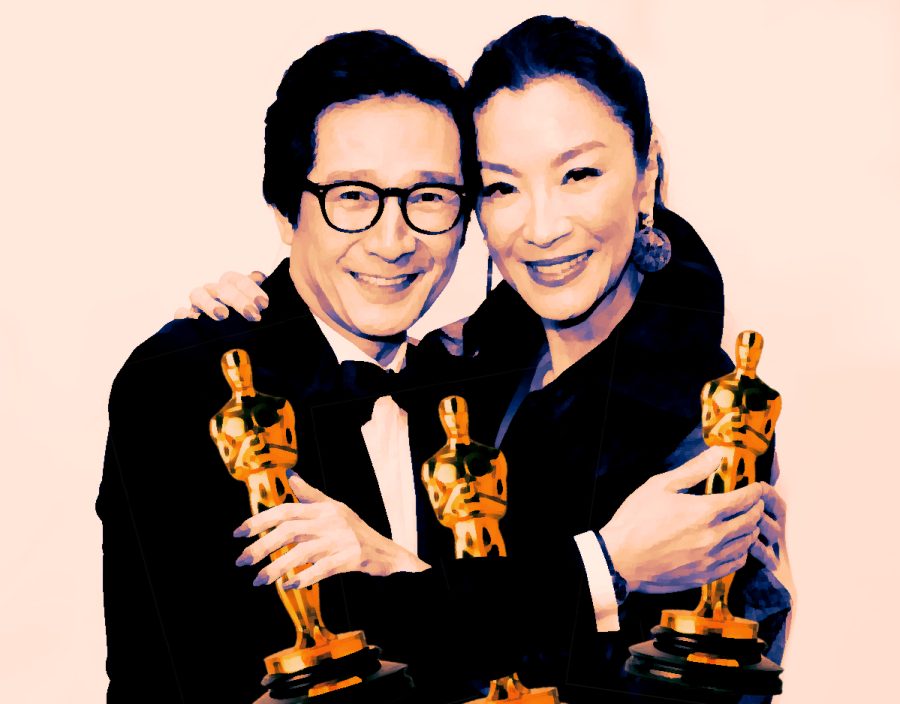Academy Awards consider diversity but disrespect Indian filmakers
March 27, 2023
The 95th Academy Awards solidified its spot as the third least-watched Oscars ever after 18.8 million tuned in.
As viewers increasingly turn away from live television in favor of on-demand streaming, ABC executives have been scrambling to revitalize the Academy Awards.
This year, they’ve almost hit the mark on two major touchstones: diversity and authenticity. Though many previously underrepresented cultures were represented among winners and nominees, Indian filmmakers were still woefully overlooked.
The USC Annenberg Inclusion Initiative report found that 6% of the 13,252 nominees since 1929 were members of marginalized racial and ethnic groups.
This discrepancy can likely be attributed to the unconscious bias of Academy-appointed voters, which a 2016 study by The Los Angeles Times determined were 91% white and 76% male.
Though the Academy has attempted to reconcile with this lack of diversity, recent estimates reveal that the organization is primarily composed of white men.
“Most say they vote on what they like, but of course we have to inspect why do they like this,” film critic Robert Daniels told CNN.
Historically, Asian actors in Asian-directed films were rarely recognized by the Oscars. But this year marked a shift.
Box office triumph “Everything Everywhere All at Once” received a leading 11 nominations, more than any other film.
Michelle Yeoh, who played the main character, made history by becoming the first actress of Southeast Asian descent to win an Oscar for Best Actress. Her co-star, Ke Huy Quan, accepted the award for Best Supporting Actor.
“[The Oscars are] finally recognizing Asian bodies, not just Asian stories,” Nancy Wang Yuen, sociologist and author of “Reel Inequality: Hollywood Actors and Racism,” said. “There are Asian subjects, actors, talent, who are actually embodying these roles and doing it just as well as any other actor that is typically nominated.”
The Oscars was also a big night for South Asians, with three different Indian productions receiving nominations and two securing the win.
“The Elephant Whispers,” directed by Kartiki Gonsalves, snagged the award for Best Documentary Short Film and “Naatu Naatu,” from the Indian action epic “RRR,” won Best Original Song.
Representation means a lot less if it isn’t authentic. Though the Academy has taken strides to mend historical injustices, the problem isn’t fixed yet.
This was glaringly apparent when the filmmakers behind “The Elephant Whispers” were called up on stage to receive their awards.
A video being circulated across social media reveals film producer Guneet Monga holding an Oscar and patiently waiting for director Kartiki Gonsalves to wrap up her speech. But as Monga makes her way to the microphone, she is suddenly cut off by music and escorted from the stage.
“I am extremely disheartened that my speech was cut off,” Monga told ETimes. “There was a shock on my face. I just wanted to say it’s India’s first Oscar in Indian production, which is such a huge thing. My heart started racing as I couldn’t have come so far and not be heard.”
She also expressed that this blunder felt like “India’s moment taken away from me.”
The director was later permitted to recreate her speech after the ceremony, but the sting of the moment was still felt across the world. After Monga was denied her winning remarks, two men were awarded Oscars and given time for full-length speeches, making the situation worse.
Furthermore, the performance of the award-winning song “Naatu Naatu” didn’t appear to include any Indian dancers.
“RRR,” an international sensation, is a product of the Tollywood film industry and yet is referred to as a Bollywood movie during the ceremony. Within India, this distinction is given a lot of significance as the origins of a movie helped establish its cultural context.
“South Asians have been in Hollywood, and for many years have been forced into roles that were minuscule or forced to hide [altogether],” Shilpa Davé, an assistant professor of media studies at the University of Virginia, said. “So, to try and diminish that, in an era in which we have seen so many strides — that is problematic.”







